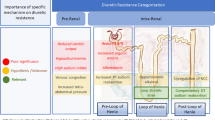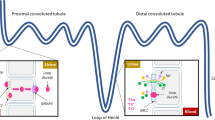Summary.
The data from animal and human in vivo studies suggest that cardiac function is dependent in part on the normal function of the GH/IGF-1 axis (growth hormone/insulin-like growth factor-1). So far encouraging results from phase II and III clinical trials evaluating the effects of intermittent GH treatment in patients with chronic congestive heart failure (CHF) due to dilated cardiomyopathy (DCM) have been published. In these studies, growth hormone (i.e., DNA-derived recombinant human growth hormone) was not used alone but in addition to standard optimal therapy for CHF. The following rationale is the basis of this new approach for the treatment of CHF due to DCM: According to Laplace’s Law cardiac wall stress (i.e., the force acting per unit of cross-sectional area of the ventricular wall) is directly related to intraventricular pressure and ventricular radius and inversely related to ventricular wall thickness. Cardiac (ventricular) wall stress is increased in DCM (mainly because of the dilatation of the ventricles and to a minor extent because of the relative reduction in ventricular thickness). GH is capable of increasing ventricular wall thickness in DCM thus reducing cardiac wall stress which in turn leads to an improvement in systolic cardiac performance.
Zusammenfassung.
Obwohl das GH/IGF-1-System (Wachstumshormon/Insulin-like Growth Factor-1) primär das Körperwachstum reguliert, beteiligt es sich auch im Erwachsenenalter an der Kontrolle einiger physiologischer Mechanismen wie der Aufrechterhaltung von Masse und Kraft der quergestreiften Muskulatur, dem Ernährungsstoffwechsel und dem biochemischen Aufbau des Organismus. Der Einfluss der GH/IGF-1-Achse auf das kardiovaskuläre System, insbesondere auf das Herz, ist größer als bisher angenommen wurde. Insbesondere sind vielversprechende Daten von Phase-II- und Phase III-Therapiestudien mit Somatropin (durch rekombinante DNA-Technik hergestelltes Wachstumshormon, r-hGH) bei chronisch-kongestiver Herzinsuffizienz (CHF) infolge einer dilatativen Kardiomyopathie (DCM) veröffentlicht worden. Die Rationale hinter diesen Studien, das heißt hinter der Behandlung der DCM mit r-hGH, baut letztlich auf dem physikalischen Gesetz nach Laplace auf. Die zugrundeliegende Hypothese lautet: r-hGH bewirkt bei der DCM eine Zunahme der ventrikulären Wanddicke und damit eine Abnahme des intraventrikulären Durchmessers. Daraus resultiert eine Abnahme der (systolischen) Wandspannung. Damit wird das kranke Herz erneut aus sich selbst heraus – autoregulatorisch – fähig, die vermehrte diastolische Füllung (vergrößerter enddiastolischer Durchmesser) durch den Auswurf eines größeren Schlagvolumens zu kompensieren. Es konnte wiederholt gezeigt werden, dass Somatropin beim Menschen die linksventrikuläre Wanddicke zu vergrößern vermag, was zu einer
Abnahme der Wandspannung und somit zu einer Verbesserung der Herzfunktion führt.
Similar content being viewed by others
Author information
Authors and Affiliations
Additional information
Eingegangen: 4. April 2002 Akzeptiert: 26. Juni 2002
Correspondence to Philipp Dreifuss
Rights and permissions
About this article
Cite this article
Dreifuss, P. Dilatative Kardiomyopathie und Wachstumshormon. Z Kardiol 91, 973–977 (2002). https://doi.org/10.1007/s00392-002-0852-9
Issue Date:
DOI: https://doi.org/10.1007/s00392-002-0852-9




